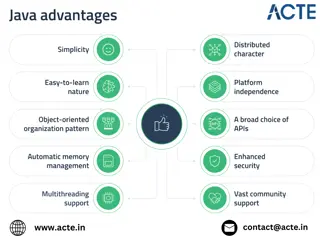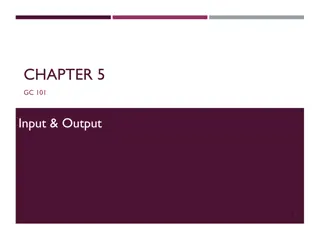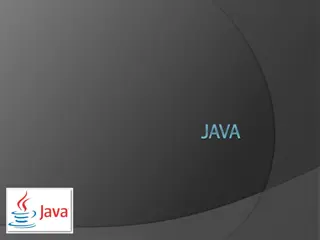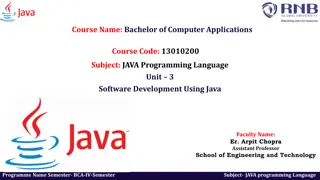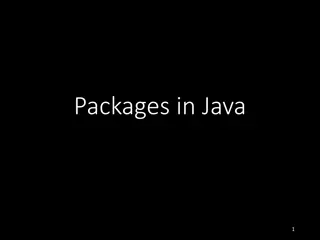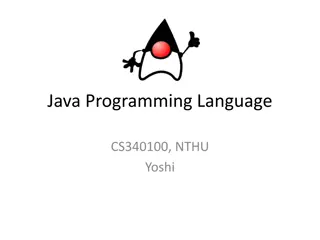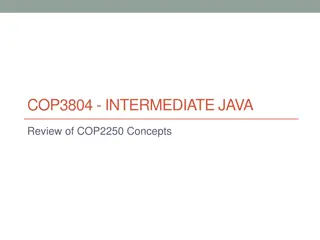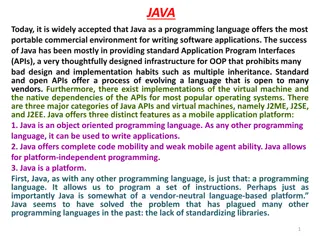Common Java Performance Mistakes
Performance issues in Java can lead to costly failures, such as the infamous Knight Capital incident. This content highlights common performance issues, bug fixing challenges, general problems, SQL concerns, connection pooling, memory management, and more.
Download Presentation

Please find below an Image/Link to download the presentation.
The content on the website is provided AS IS for your information and personal use only. It may not be sold, licensed, or shared on other websites without obtaining consent from the author.If you encounter any issues during the download, it is possible that the publisher has removed the file from their server.
You are allowed to download the files provided on this website for personal or commercial use, subject to the condition that they are used lawfully. All files are the property of their respective owners.
The content on the website is provided AS IS for your information and personal use only. It may not be sold, licensed, or shared on other websites without obtaining consent from the author.
E N D
Presentation Transcript
JAVA PERFORMANCE MISTAKES Peter Veres Senior Software Engineer Peter_Veres2@epam.com 1 CONFIDENTIAL
Common performace issues Performance is a business goal Most performance issues in Java can be attributed to a handful of root causes 2 CONFIDENTIAL
Performance failures are exepensive 2012, Knight Capital: The most expensive faulire Instead of shutting down gracefully, computers began issuing commands to buy and sell securities It only took a half hour, but by the end the losses totaled an estimated $440 million Many similar failures aren t as visible Only slow down or halt a website without leaving much of a trail The customers show up, click in vain, then move on 3 CONFIDENTIAL
Time spent in bug fixing 4 CONFIDENTIAL
JAVA PERFORMACE GENERAL PROBLEMS 5 CONFIDENTIAL
General problems Bad architecture decisions Using of existing APIs in a wrong way 6 CONFIDENTIAL
JAVA PERFORMACE SQL 7 CONFIDENTIAL
N+1 problem 8 CONFIDENTIAL
Caching No cacheing Configurare caching Distributed caches 9 CONFIDENTIAL
Connection pooling Reasons Relatively expensive to create/close Share connections across business transactions Limit to load (load testing) 10 CONFIDENTIAL
JAVA PERFORMACE MEMORY 11 CONFIDENTIAL
Stop-the-world GC Managed memory management in Java Major GC stops-the-world Apply a GC strategy sun.misc.UnSafe / Off-heap APIs 12 CONFIDENTIAL
Memory leaking Reference to an object that it does not ever intend to use again Tipically Collection framework classes with unbounded growth Running out of memory vs memory leak 13 CONFIDENTIAL
JAVA PERFORMACE PROBLEMS WITH THE CODE 14 CONFIDENTIAL
StringBuilder String result = (new StringBuilder("<")) .append(epam).append(">").toString(); System.out.println(result); String result = "<" + epam + ">"; System.out.println(result); String result = (new StringBuilder("<")) .append(epam).append(">").toString(); result = (new StringBuilder(String.valueOf(result))) .append("</").append(epam) .append(">").toString(); System.out.println(result); String result = "<" + epam + ">"; result+= "</" + epam + ">"; System.out.println(result); StringBuilder result = new StringBuilder("<"); result.append(epam).append(">").append("</").append(epam).append(">"); System.out.println(result); 15 CONFIDENTIAL
Iterator List values = new ArrayList(); String value; // return new Itr(); for(Iterator iterator = values.iterator(); iterator.hasNext(); System.out.println(value)) value = (String)iterator.next(); } List<String> values = new ArrayList<String>(); for (String value : values) { System.out.println(value); } 16 CONFIDENTIAL
Using the stack // on the heap Integer value = 123456; // on the stack int value = 123456; // 3 objects on the heap Integer[] i = { 123456, 654321 }; // 1 object on the heap Integer[] i = { 123456, 654321 }; 17 CONFIDENTIAL
.valueOf() Integer i1 = Integer.valueOf(NUM); Integer i2 = Integer.valueOf(NUM); System.out.println(i1 == i2); Integer i1 = NUM; Integer i2 = NUM; System.out.println(i1 == i2); 18 CONFIDENTIAL
Recursion Recursive methods solve difficult problems in a really simple way Each recursive call adds a new frame to the stack Some compilers optimizing tail-recursing algorithms back into iterative ones, but javac NOT int sum(int actual, int total) { if (actual == 0) { return total; } else { return sum(actual - 1, total + actual); } } int sum(int actual) { int total = 0; for (int i = actual; i > 0; i--) { total+=i; } return total; } 19 CONFIDENTIAL
hashCode() and equals() JDK hash based collections store their values in an array. Hash code is used to calculate an initial lookup position in this array If all values will have the same hash code, hash map (or set) will degrade into a list 20 CONFIDENTIAL
Metrics vs checking code Before you start the check the code manually, check metrics SQL executions Time spent in functions 3rd party calls Memory usage GC runs Heap dump etc. 21 CONFIDENTIAL
Test automation Goal: functional and architecture confidence Automate and measure you application Use the metrics as quality gates 22 CONFIDENTIAL
THANKS FOR YOUR KIND ATTENTION Peter Veres Senior Software Engineer Peter_Veres2@epam.com 23 CONFIDENTIAL





